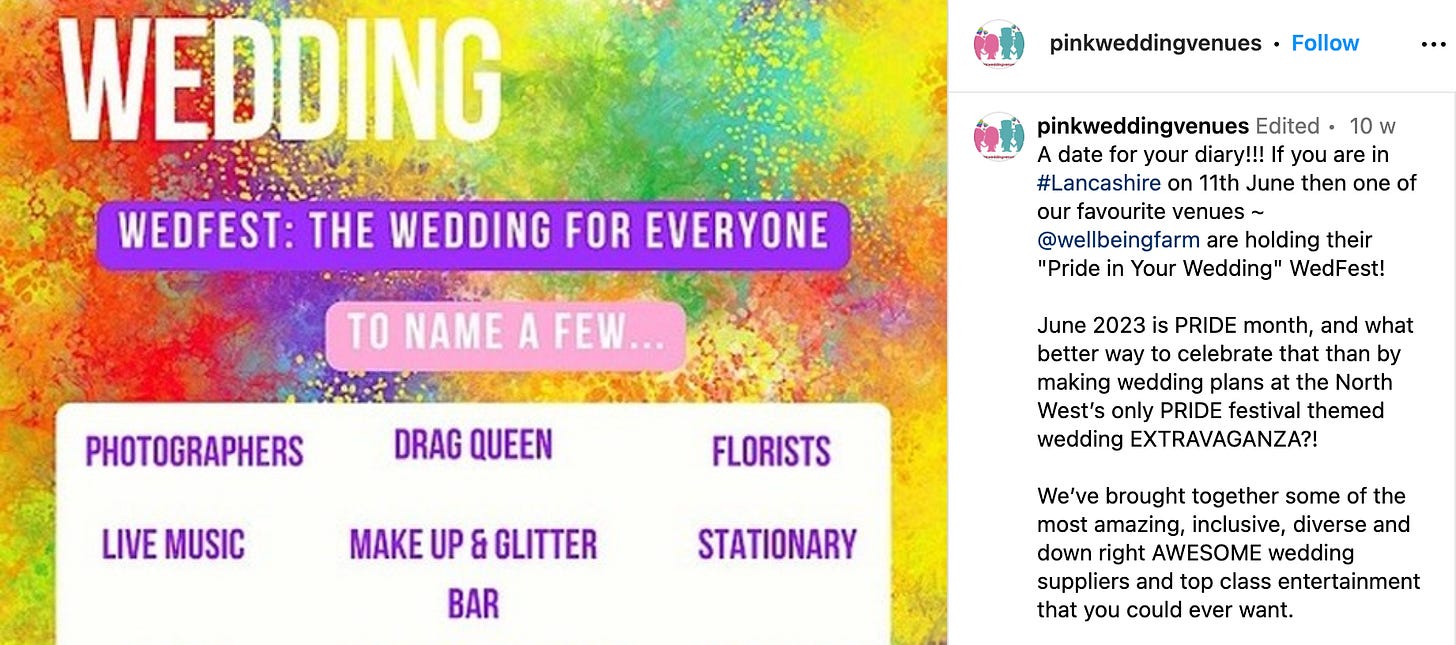(Alamy/PA)
As ‘wedding season’ begins, how do LGBTQ+ couples choose the right venue for their day? By Abi Jackson.
Budget, guest list, venue – there’s a lot to think about when planning a wedding. And as Alex Hickson and Oliver Burr discovered after getting engaged last year, as an LGBTQ+ couple, additional considerations can crop up.
“We quickly faced a couple of stumbling blocks,” Hickson, 26, recalls of when he and Burr, 35, started researching options. “The first wedding fayre we attended, we were asked, ‘Where is the bride?’ as soon as we entered. Staff didn’t know how to react when we said we were two grooms and a same sex couple.
“Despite much of this experience coming from ignorance and a lack of inclusivity rather than malice, it made us realise so many people must’ve experienced the same.”
Hickson and Burr, who live in Yorkshire and work in digital PR and talent acquisition respectively – and started a podcast, called Where’s The Bride, about their experiences navigating the wedding industry – now have their big day set for September.
And it’s not like there aren’t lots of options out there for LGBTQ+ couples. Last year, the England and Wales census detailed the full number of same-sex unions for the first time, with around 402,000 legally formalised same-sex relationships recorded in 2021. Of these, 133,618 were civil partnerships (introduced in 2005) and 268,522 were marriages – which became legal in Britain in 2014 (2015 in Ireland and 2020 in Northern Ireland).
But it’s not just a question of finding vendors who are willing to host and cater for LGBTQ+ weddings. It’s about inclusivity, and this being reflected in vendors’ marketing imagery and language.
“For us, it was that any vendors we chose wanted to celebrate us as a couple as much as any other,” says Hickson.
“We talk about this a lot on the podcast. Very few wedding fayres or vendors feature anything other than a straight, white couple – and it’s incredibly isolating. If you can see yourself, you can imagine them being a part of your special day – vendors that had same sex couples made us feel far more at ease even before we’d spoken to them.
Alex Hickson / Handout / PA
“I think there’s still huge strides to go for inclusivity in the industry,” he adds. “Terminology such as ‘bridal suite’, ‘bride and groom’ etc can all be tweaked to make that planning experience more inclusive and not isolate couples who aren’t heterosexual.”
Elaine Cripps, managing director of Pink Wedding Venues (pinkweddingvenues.co.uk), an online directory for LGBTQ+ folks, agrees inclusivity and representation are a vital part of the picture.
“Most of the wedding industry is reaching out and does want to get it right and be inclusive – of course they do. I just feel visibility could be better. We [the LGBTQ community] are a big marketplace, and it’s good for businesses to reach out to consider and include us in their marketing and messaging,” says Cripps.
“A venue is the most expensive part of a couples’ day. It’s a huge investment, and it needs to not only ‘be right’ in terms of location, price and capabilities’ it needs to ‘feel right’ too.”
Cripps and her partner/wife Shani had a “wedding of sorts” 24 years ago (“This was back in 1996, long before even civil partnership had become legalised”). It was also pre-Google, so organising it meant hitting up the Yellow Pages.
(Elaine Cripps/Handout/PA)
“It soon became apparent that there weren’t many venues who would entertain us holding a ceremony/blessing,” Cripps recalls. “But after a few phone calls, we found an LGBTQ vicar who ran a small community chapel and was more than happy to perform a blessing for us, and we enjoyed a fabulous day.”
When the opportunity arose – and as LGBTQ marriage rights progressed – Cripps realised there was a demand and gap in the market for something like Pink Wedding Venues.
“I wanted to create a resource for LGBTQ+ couples to feel confident the venues they reach out to are LGBTQ+ friendly, and on the flipside have a platform for LGBTQ+ friendly venues to reach out to same-sex couples. This was, and still is, relatively new for the wedding industry, and so many venues were worried about ‘getting it wrong’,” she explains.
These days, she also delivers masterclasses to venues on this topic and says just a few small tweaks towards making language and terminology more inclusive can be a win-win. This also needs to filter through to everything from suppliers a venue recommends, to the wording and options on order and enquiry forms.
“When a couple is making an online enquiry, sometimes we see the forms with: ‘Bride’s name’ and ‘Groom’s name’ – no ‘Brides/Grooms’ or ‘Partner’s name’. So suddenly a same-sex couple can feel miffed, or absolutely turned off as there’s no option for their partner’s name,” Cripps notes.
After all, for many excited couples, weddings are the utmost celebration of their love – and quite often the biggest single expenditure of their lives, outside of buying a home or raising a family.
Cripps says: “Visibility creates normality, so the more often we see ourselves being represented and ‘people who look like us’ means we can feel considered and included.”





